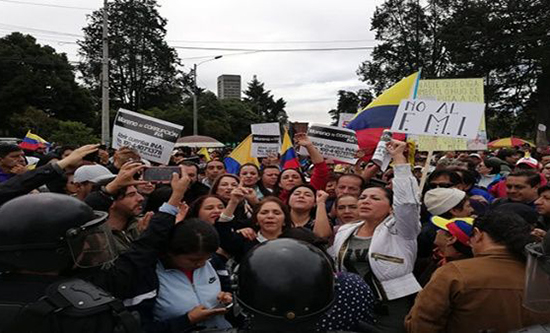
In early October, mass mobilisations against President Lenin Moreno and the IMF, led by Ecuador’s indigenous communities, forced the government to declare a state of emergency, flee the capital Quito, and impose martial law and a curfew across the country. Nine people were killed by state forces and thousands injured. The demonstrations were triggered by the government’s elimination of fuel subsidies, resulting in an overnight doubling of fuel prices. Decree 883 came into effect on 2 October as part of the neoliberal reform package agreed by Moreno and the IMF in exchange for IMF loans. Although 11 days of huge protests forced him to repeal the decree, Moreno is now stepping up measures to persecute those involved in the uprisings.
Decree 883 eliminated a 60-year fuel subsidy, causing the price of gasoline to rise from $1.85 to $2.30 a gallon and diesel from $1.03 to $2.27 a gallon in a matter of hours. It came after Moreno agreed a multi-billion dollar loan with the IMF requiring a structural reform programme to push through austerity measures, including privatisation of public services, mass lay-offs, cuts in social spending and limitations on workers’ rights. While Moreno insists the loans are necessary due to a debt rate at 60% of Ecuador’s GDP left by his predecessor, Rafael Correa, RT reports that Correa actually left the debt rate at 40% and it was under Moreno that it rapidly grew to 55% in less than 2 years.
As reported in FRFI article ‘Ecuador rises up against neoliberal President’, Moreno was elected to power in 2017 running on a platform for the continuation of ‘building socialism in the 21st century,’ as initiated by Correa. As soon as he reached government, however, he began implementing a right-wing agenda to the detriment of the poor, working class and indigenous people. His approval rating soon plummeted to 17%. For months, workers have taken to the streets in opposition launching repeated strikes.
The cause of the protests was expressed in the ‘letter of intent to the IMF’ published by the Confederation of Indigenous Nationalities of Ecuador (Conaie) on October 23, which demanded an ‘end to the pressure [from the IMF] to sign letters, treaties, agreements that do not benefit the Ecuadorian people, as was made clear by the discontent of the indigenous movement and the Ecuadorian people protesting in the streets.’ This has not stopped Moreno – alongside US puppet and self-proclaimed President of Venezuela, Juan Guiado – from declaring the uprisings to be masterminded by Correa and Venezuelan President Nicolas Maduro.
Moreno has joined the far-right Presidents of Brazil and El Salvador in expelling Cuban medical practitioners, absurdly insinuating that the health professionals, who have since 1992 assisted millions of Ecuadorians with free access to healthcare, were conspiring with Correa and Maduro to bring down the government. Accusations of foreign collaboration have been resolutely rejected by Conaie, whose President Jamie Varda asserted that ‘the mobilisation was organised by our movement. Our stance is stronger than ever, with the backing of different social classes.’
The unprecedented violence on behalf of state forces to suppress demonstrators was extreme enough to prompt the Army to step to the defence of protestors being attacked by police. The brutal repression failed to stop Ecuadorian resistance and Moreno was forced to the negotiating table with Vargas and another indigenous leader, Diálogos Por La Paz, in a live-on-air debate on 15 October. During the debate, having been encouraged by UN advisories, Moreno agreed a repeal of Decree 883 in hopes of quelling the resistance movement.
However, representatives from the murderous US-founded School of America’s have since announced their cooperation with the Moreno government to apply anti-terrorism tactics to persecute those behind the uprisings, as Moreno continues to frame the protests against IMF-backed austerity as an attempted coup against his Presidency. As well as censoring media outlets which reported on the uprisings (Telesur and RT were both taken off air), Moreno’s attempts to silence opposition voices have included imprisoning leading members of Conaie and of the Citizen Revolution Party founded by Correa, such as Party leader Virgilio Hernandez. Vargas has said ‘We cannot dialogue with the government if they are indicting our leaders for rebellion, so if we have to take measures, we are ready to do that.’
Moreno remains hugely unpopular. On Sunday 17 November he faced another humiliating defeat when the National Assembly voted to reject the latest package of tax and monetary reforms put forward by the government with the agreement of the IMF. The proposed reforms included the legalisation of money laundering and measures to benefit tax evaders, attempting to open the doors to state sanctioned corruption. Indigenous protests against IMF-imposed reforms and against the criminalisation of opposition forces have continued relentlessly. In Ecuador and across Latin America, people are rising up against neoliberalism and imperialism and we must stand in solidarity with their heroic resistance!




